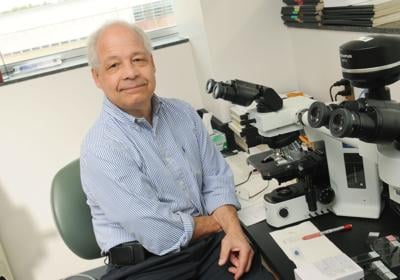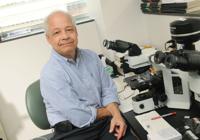With the large-scale distribution of a COVID-19 vaccine not expected until next spring at the earliest, experts expect that accurate and widely available rapid testing will be crucial in getting some people back to work, and an ongoing research program at George Mason University is hoping to help that become a reality.
The $150,000 pilot program – funded in part by a $100,000 GO Virginia Economic Resilience grant – has multiple objectives, all generally aimed at allowing frontline health-care workers and others to safely return to the workplace as early as possible.
That doesn’t mean, the researchers say, that the goal is to create a sense of superficial safety defined simply by increased sanitization and distancing. It’s instead to improve rapid testing methods and antibody testing to better understand who might be asymptomatic but COVID-positive and who might likely be immune. While the scientific community has not reached consensus on whether COVID antibodies make one immune forever, there is strong evidence that they convey immunity for some time.
Another component of the pilot program, led by epidemiology professor Amira Roess and systems biology professor Lance Liotta, looks to help those frontline workers deal with the stress and anxiety of working during the pandemic.
According to Roess, the pilot study should be wrapped up by the end of the year, but researchers are seeing in real-time the impact of a dramatic fall wave of COVID-19 cases, with the expectation that the numbers will only get worse following Thanksgiving gatherings.
“We’re seeing a lot more nurses reporting exposures, reporting symptoms. We did a survey early in the summer and another one now and you’re seeing a big difference in the results now,” Roess told InsideNoVa.
For everyone involved, the situation in Virginia’s hospitals is rapidly worsening once again. According to the Virginia Hospital and Healthcare Association, there were 1,512 people hospitalized with the virus in the state as of Monday, nearing the high-water mark of 1,625 in early May. Only a month ago, fewer than 1,000 people in the state were hospitalized with COVID-19.
But preliminary findings from the GMU researchers are also showing that health-care workers have a significantly increased probability of past infection in comparison with the general public. At the same time, they’re also reporting “very high” stress levels, according to Roess.
“There’s a lot of stress associated with this. The other thing that we’re seeing is a little bit of fatigue and maybe some [post-traumatic stress disorder],” Roess said. “Nurses, frontline workers got hit really hard earlier in this pandemic and now they’re getting hit really, really hard again, and the long-term impacts of this, I don’t think we’re really prepared for it. They need our support.”
The GMU team hopes their work will ultimately lead to better ways to help frontline workers through the stress and anxiety brought on by the pandemic, and possibly the lingering emotional and psychological effects.
Forty graduates from Mason’s School of Nursing in Fairfax County, Prince William County and elsewhere have been the first to participate in the program, which will ultimately increase to 80 students, each of whom will be given rapid self-testing kits, swabs and biweekly antibody testing.
Roess said the researchers are analyzing data on a number of competing rapid testing kits, comparing them with results from the more reliable, but slower, PCR tests. Zeroing in on the most accurate rapid tests could affect workplaces well beyond hospitals.
“It’s such an important step in building confidence in our community and preparing our region for safely getting back to work,” Prince William County Director of Economic Development told GMU’s news service.
But the researchers say the core focus is on what the program will mean for hospitals and those who work in them. Central to that effort is nursing school professor and longtime nurse mentor Dr. Cheryl Oetjen. She is helping to manage the graduates in the study, who are getting early emergency experience none of them ever envisioned, or wanted.
“We are hearing a lot about the challenges of working in this prolonged pandemic. The stress this has placed on nurses in the early part of their careers cannot be understated,” Oetjen said.
“We do need to seriously address the long-term health impacts, both physical and mental, on these critical workers. We are hearing from frontline workers outside of this study about the difficulty in balancing their personal lives … protecting their loved ones at home with doing what a lot of them consider is their professional obligation.”



(0) comments
Welcome to the discussion.
Log In
Keep it Clean. Please avoid obscene, vulgar, lewd, racist or sexually-oriented language.
PLEASE TURN OFF YOUR CAPS LOCK.
Don't Threaten. Threats of harming another person will not be tolerated.
Be Truthful. Don't knowingly lie about anyone or anything.
Be Nice. No racism, sexism or any sort of -ism that is degrading to another person.
Be Proactive. Use the 'Report' link on each comment to let us know of abusive posts.
Share with Us. We'd love to hear eyewitness accounts, the history behind an article.